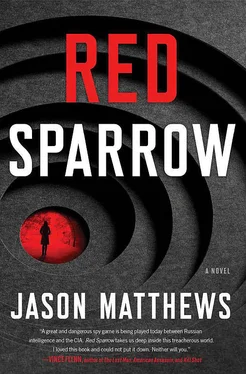“And then there was Helsinki, I assume you know she was there. Then an operational flap, not her fault, but there was trouble, and they brought her back and sweated her for two months. In Lefortovo, can you imagine, like the old days. I can tell you she will not soon forgive them that.
“I’m saving the best for last,” said MARBLE, sitting back in his chair. “I know what you’re thinking, that her career prospects as a woman are doubtful, that she is on the bottom rung of the ladder, that she will never, ever be able to develop any access. I propose to accelerate her career, to ensure her success, and she will never have to sit on a single general’s lap, mine included.”
“I see,” said Benford. “And how will you accomplish this, to catapult her to stardom?”
“Vanya Egorov is obsessed by the almost-certain knowledge that there is a spy in the Service.” MARBLE pointed to himself and laughed. “He in fact directed Egorova to Helsinki to get close to Nathaniel to generate some clue, or a name, about who the spy is. Did you know Nathaniel was targeted in Helsinki?” Benford kept his face shut down. MARBLE continued.
“Vanya’s plans have been delayed by her security investigation, but she is out, and cleared, and frankly this test of her, this Lefortovo episode, gives her more allure, more losk, more luster.”
Only Russians can think like this, thought Benford.
“I have taken her into my department,” said MARBLE, “to give her a foundation. Vanya has informally asked me to reopen the operation using Dominika against Nate, and this will establish her as my close subordinate. We will choose our best moment, you and I, Benford, then make young Egorova a heroine, a star in the Service, her career assured, from whom no advancement will be denied.”
“The payoff, Volodya,” said Benford. “It’s getting late. How are you going to make her a heroine?”
“It’s quite simple,” said MARBLE. “Dominika will discover I am the spy and turn me in.”
=====
They wanted the noise and the people and the distance from the UN, away from the other Russians, in the Village, on West Fourth Street. It was MARBLE’s last night. The restaurant had a red canopy, with steps down from the street, and drawings of dancers on the walls, and high-backed wooden booths that screened well and let them talk. Benford made MARBLE order pasta con le sarde, Palermo-pungent with finocchio and saffron and raisins and pinoli, and they sat shoulder to shoulder at the table, so they could hear each other.
Benford was worked up, talked a blue streak, was even a little frightened. He had thought about it for two days, from every angle, and it was monstrous, impossible, exorbitant. Things weren’t that desperate; if they had to suffer a break in the intel stream, then so be it, it was the nature of things. But to contemplate giving yourself the chop simply to establish a successor—it cannot happen, he said. MARBLE said of course it could happen, it had to happen.
“If I am caught—who knows how the mole hunt will end?—it all stops instantly, no retrieving anything. We cannot afford to let things fall apart, and if you doubt it, then think about the faceless illegal crawling around the inside of a submarine, or whoever is SWAN, reporting to Yasenevo from Foggy Bottom or Capitol Hill or the White House. We can’t afford to wait.”
And Benford, running out of room, said there was no guarantee that Dominika would even get the boost she needed and MARBLE’s gesture would have been wasted, to which MARBLE said, Don’t be a shutnik, are you kidding? A young officer, a woman in the new-age Russian Service, covetous for a place in the new millennium, with a counterintelligence coup like that, they’ll make her a colonel overnight. Benford looked at MARBLE and ordered two more grappe, and MARBLE said, Look, Benford, if I told you I have cancer and they give me a half year, would it make more sense to you? and Benford said, You have cancer? And MARBLE said no, and Benford said, Now who’s being the shutnik ? Benford was down to his last card and said, rather pathetically, What about retiring to New York? MARBLE smiled and said he never really expected he would, he really couldn’t finish it like that, and put his hand on Benford’s arm and said, Let’s play it forward a step at a time, to see how it shapes up, and Benford, surrendering, said, On one condition: We don’t tell anyone—not even Nash—until we’re sure, and MARBLE said, Two conditions: We don’t tell Egorova either. And they drank the grappa as the voices of the late-night crowd swirled around them, secure in their conspiracy.
PASTA CON LE SARDE
In olive oil sauté chopped onions, slivered fennel, saffron, golden raisins, and pine nuts. In the bottom of the same skillet melt cleaned fillets of sardines and anchovies. Add a splash of white wine, season, cover, and simmer until flavors mingle. Toss with pasta of substance such as bucatini or perciatelli.
MARBLE’s reports aboutillegals and moles were restricted to a few senior managers in ROD. The real gerents of the information were the fussy introverts in the CIA’s Counterintelligence Division, the cave dwellers of the fourteen-hour days in the wilderness of mirrors, the balmy men and women who at home had train sets in their basements and pruned bonsai trees. They began to read Nate’s reports, dissecting the information, starting the research.
On his return from New York, Nate was summoned again to Benford’s lair. CID occupied an entire floor of Headquarters, a series of interior rooms bisected with hallways and warrens that, unlike the normal Headquarters suites, were equipped not with the usual cubicles, but with individual offices. All the doors were closed, each had a combination dial above the doorknob. There occasionally was a door without a knob, the keyway painted over. What were these rooms, and what did they contain? A bland secretary whose left eye twitched intermittently sat at a desk outside Benford’s office. She looked at Nate carefully, blinked, got up, and knocked on the door, but did not open it. She listened carefully, then knocked again, gingerly. A voice from inside, and she opened the door a crack, uttered Nate’s name, and stood aside, motioning for him to enter.
Benford’s office looked like the atelier of a dissolute professor at a forgotten midwestern college. A torn and faded couch along the back wall was completely covered by stacks of files, some of which had fallen to the floor, where they lay fanned out like spilled poker chips. At the other end of the room, Benford’s desk was a riot of overflowing in-boxes, stacked three high. A pile of newspapers leaned precariously on the opposite corner. On the walls were small framed photographs—grainy, black-and-white—not of wife, children, or relatives, but rather of bridges, tree stumps, wooded country lanes, and snowy alleyways between derelict warehouses. Nate realized that these were photographs of infamous sites, long-ago signals, drops, and car pickups. Benford’s children. Behind Benford’s desk was a framed photograph of the Neo-Baroque All-Russia Insurance Company building in Moscow, otherwise known as the Lubyanka.
“Have a seat,” said Benford, his voice gravelly and low. Benford was short and paunchy, with a high forehead and uncombed salt-and-pepper hair, a wing of which stood out from the side of his head. He looked at Nate with large, deep-brown cow’s eyes through long lashes that were nearly feminine. Jowly cheeks framed a small mouth that displayed in its constant tics and frowns Benford’s utter disgust, or at best his contemptuous dismissal, of the matter at hand. “I read your final reports from New York,” he said. “Grammar notwithstanding, they were satisfactory.”
Читать дальше












